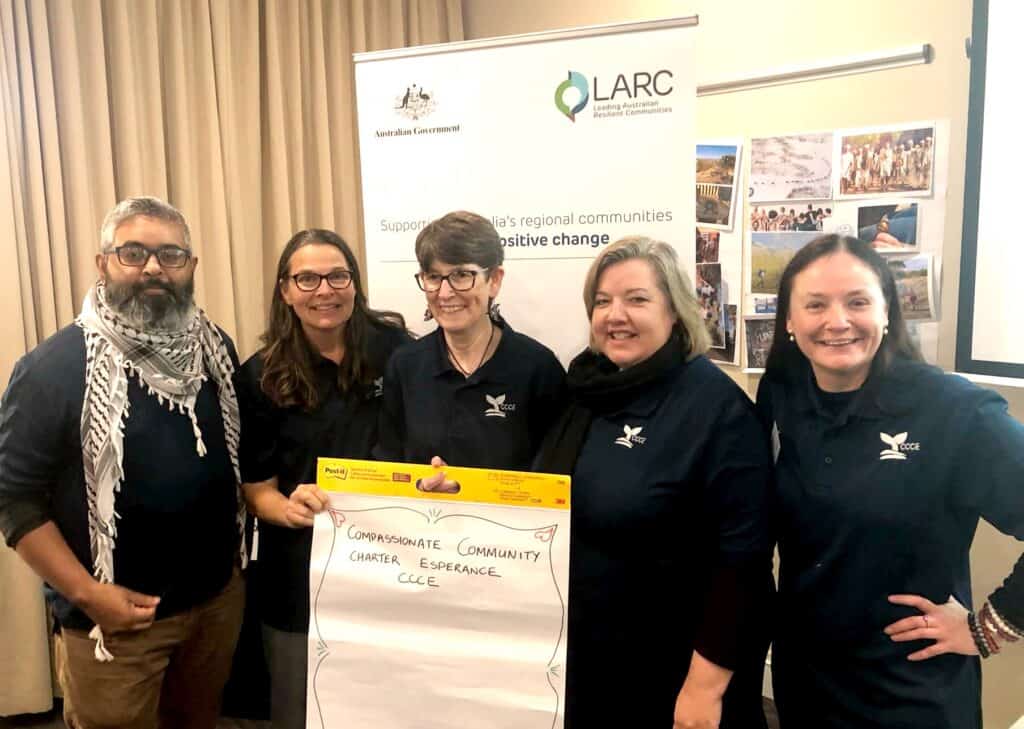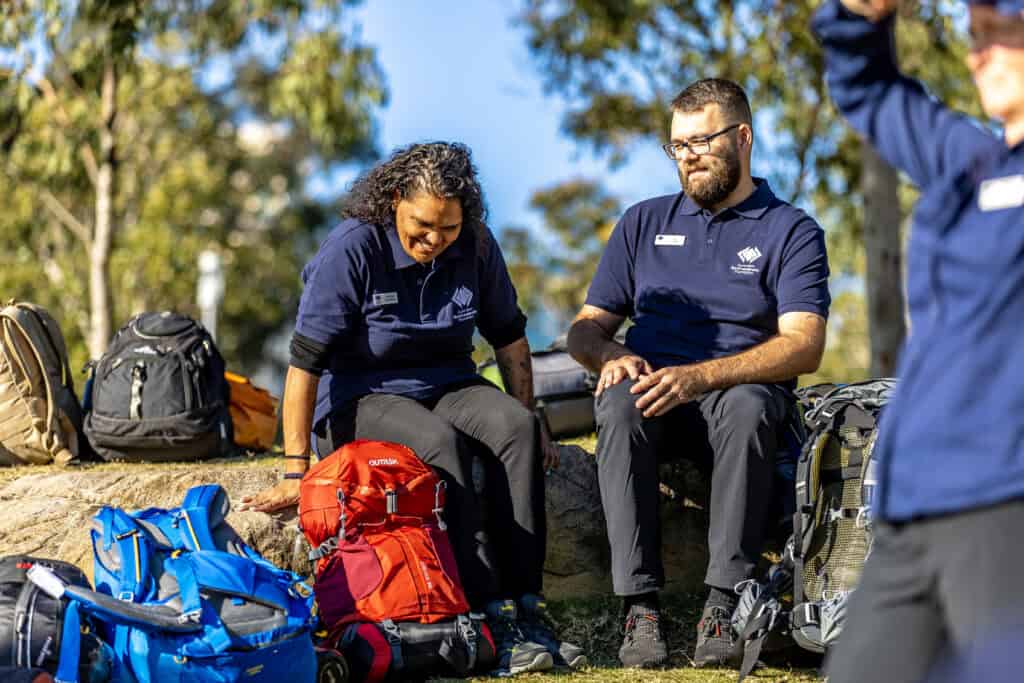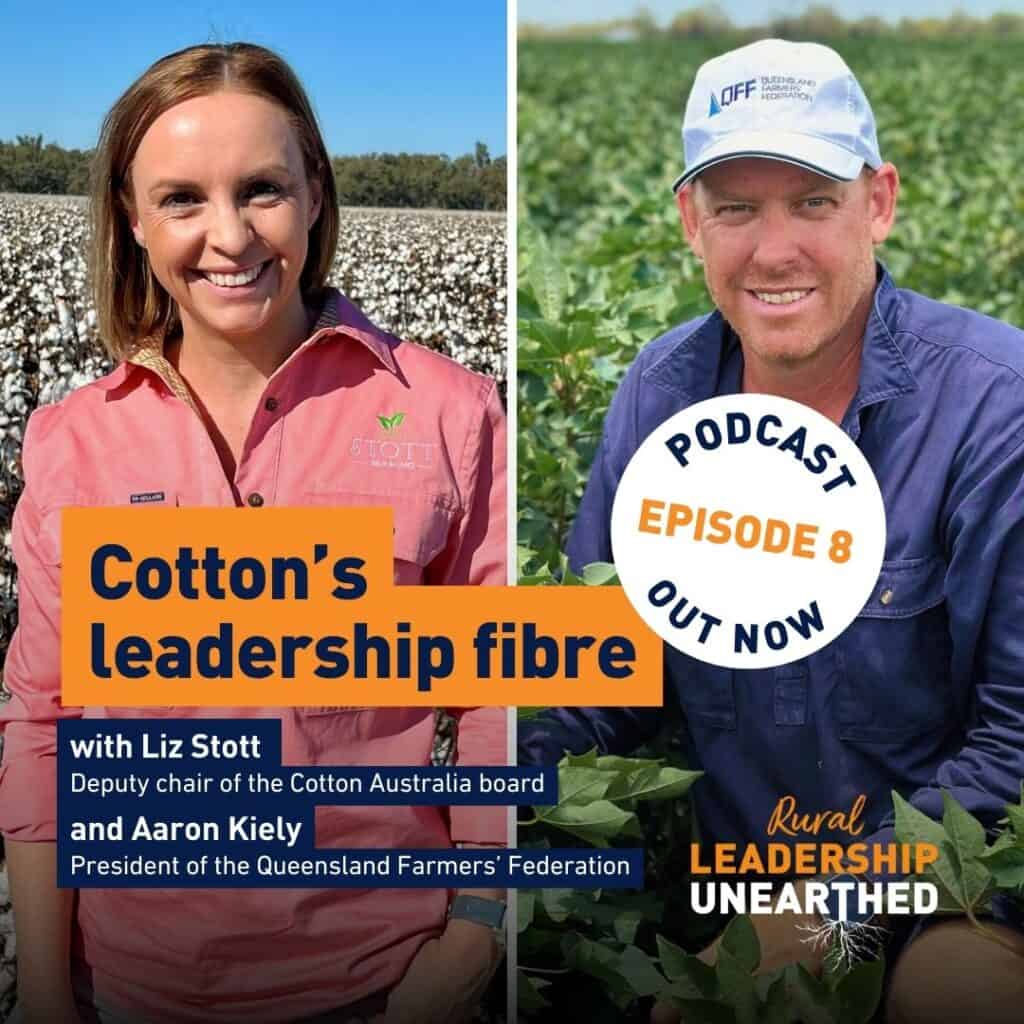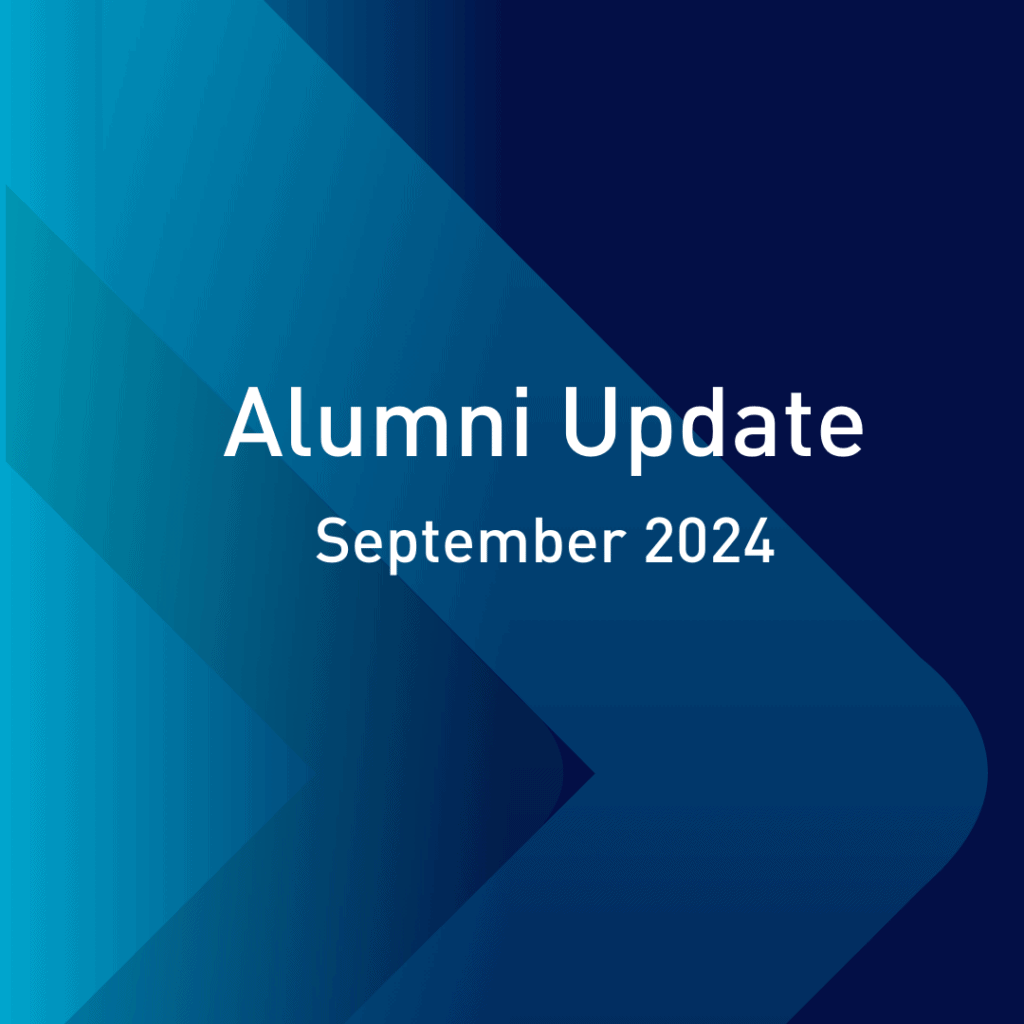Compassion is being harnessed by a leadership network in Esperance determined to foster a healthier and stronger community.
They’re graduates of the Leading Australian Resilient Communities (LARC) program and the driving force behind a Compassionate Community Charter embraced by the community. Linked to empathy and sympathy, dictionaries explain why compassion is a powerful force for good: it involves feeling another’s pain, combined with the desire to act to relieve their suffering.
Following the LARC program – a collaboration between the Australian Rural Leadership Foundation (ARLF), Regional Australia Institute (RAI) and Leadership WA that involved intensive leadership development and mentor supervised work on a chosen community project – Esperance’s graduates were determined to make the Compassionate Charter a reality.
Backed by the local shire, the Esperance Compassionate Community Charter now serves as a set of guiding principles to help decision-makers identify and prioritise programs to improve community health and wellbeing, resilience and connection.
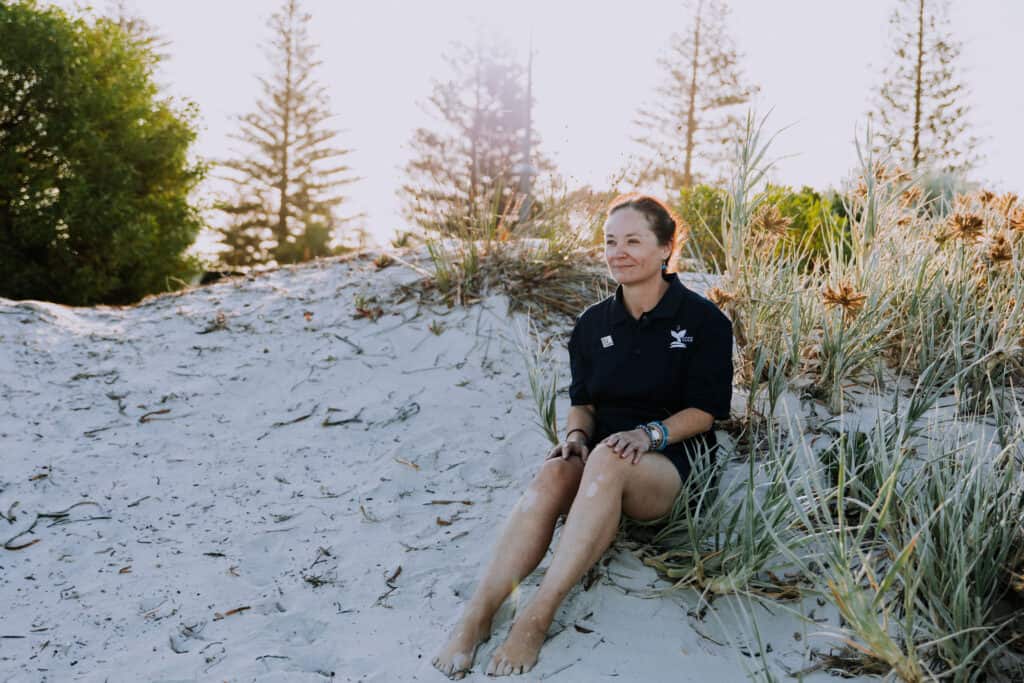
LARC arrived at a time of need, for individuals and community.
For most Esperance graduates, LARC arrived when it was needed: for some, it was time to engage in an activity that fostered connections in place; for others the need was deeper, more personal.
All saw the need for more compassion in their home community.
Battered by devastating fires that destroyed property and claimed lives in 2015, floods in 2017, a spate of youth suicides, followed by Covid lockdowns and illnesses, the community’s capacity to heal was stretched. Policy decisions, including demolition of the much-loved Tanker Jetty, the WA State Government’s proposed marine park, and a revised Aboriginal Cultural Heritage Act (ACHA), combined with discussion around the Indigenous Voice to Parliament, created discontent and divide.
As LARC graduate Kelly Brady puts it, the community has endured grief and trauma.
“There was a lot of grief stemming from many different things: loss of life in bushfires, the Jetty…there is a broken relationship between the majority of the community and First Nations people, which became more evident with the ACHA and the Voice,” she says.
For Kelly, LARC arrived when she was a relative newcomer, still finding her way. It introduced her to people within her community with similar values, and she developed connections she appreciates professionally and personally.
“I found a safe place where I was welcomed, and I have flipped the script.”
Kelly has returned to work in the health sector after a stint as a researcher in a local MP’s office, sustained by the supportive network she now has.
Following LARC, graduate Lori-Ann Shibish saw that her fractured community was suffering from the lack of a particular kind of leadership: one which allowed for respect of belief systems and feelings of others.
As a community engagement practitioner, she was aware of how poorly delivered engagement had exacerbated community angst, and with LARC under her belt, she could see clearly how proposed change could be handled without the negative impact. Not only did LARC give Lori-Ann the space and support she needed to heal following some of the contentious community engagement, but it gave her hope.
“LARC gave me a better understanding of how leadership and community engagement benefit the community, if done well,” she says.
She adds that when people and communities did not behave respectfully over issues, including multiple opinions, there was lasting friction.
“This can be avoided by good leadership and authentic community engagement, enabling navigation through differences of opinion and feelings: if people feel heard, even if they don’t get the outcome they desire, the long-term damage is avoided.”
LARC participant Meredith Waters echoed Lori-Ann’s assessment of leadership impact during times of change. She says community leaders tackled issues like the pandemic well, given the information they had. But that navigating through difficult times required special skills, like compassion.
Inspired by contact she had with Compassionate Communities through her role in regional health, Meredith brought the concept to the fore when the LARC participants were sharing their ideas and aspirations regarding improving Esperance’s resilience.
Compassion all encompassing
As one of the cohort, Divyan Varghese was not sure his idea would fit in the with the concept of a Compassionate Charter. He wanted to use his counselling experience to work on educating the young…working to tackle health during early childhood so there was less need for his skills among adults in his community.
“To start off with, I found it a bit difficult, with a lot of people. I found it hard to align my vision,” he says.
But once the group started working on the project, he could see clearly that his vision fitted.
“The concept of compassion makes it much easier.”
While working on the Compassionate Charter as a whole, he’s using networks to develop Mental Health Champions in the community’s primary schools.
“We will be identifying children with a passion for promoting good mental health and awareness, creating role modelling of compassion to young kids.”.

Leading from the same platform
Reflecting on what he had learned from LARC, Divyan says one of the key learnings was that leadership was not necessarily hierarchical.
“In some sectors you need that, but it is not always the case. Leaders can be on the same platform as long as the vision is shared,” he explains.
Divyan says the LARC program also made him realise that he could be more open to the perspectives and views of others, a finding which rang true with Meredith.
“LARC honed the concept of leading from behind and reminded me that I need to look at my own agenda, and make sure I include the input of others. That was really helpful,” Meredith agrees.
But the LARC learnings were not all about self-reflection.
“LARC gave me some new skills while affirming some I already had, and models of operating like the Cynefin Model have been so useful,” Meredith says.
LARC participants learned how the Cynefin Model works as a problem-solving framework that enables people to break down problems and find solutions in a logical way. They valued access to knowledgeable presenters and trainers, while being provided with a safe place to learn leadership qualities.
Changing conversations and creating an accepting community
The LARC experience benefitted graduates by developing and refining skills and provided access to a network of community contacts, but Esperance’s benefit is long term.
Jo Aberle moved to the coastal town in 1999, attracted by its beautiful environment and employment with Escare, an organisation that encompasses a wide-ranging portfolio of community development programs and projects aimed at increasing the capacity of individuals and families.
Now Escare’s executive officer, Jo is ideally placed to view how leadership moulds community and has an informed opinion regarding LARC and the Compassionate Charter’s impact.
She recognises that as a conservative area, change of any nature is always a hard sell, especially when it challenges social norms and traditional views of Esperance’s character.
“Esperance as a place may have changed and be a bit more accepting, but on the flip side, the advent of social media means there are keyboard warriors online and the negativity that can bring,” Jo says.
The impact of social media could be dismissed. But Jo pointed out that in a Shire with a population of 13,883, and 12,500 people joining the Esperance Community Page on Facebook, it might have a great sway on attitudes. And this is one area the LARC project is tackling, through the Compassionate Champions badge that can be awarded to people who help quell the nastiness and negativity that pervades many social posts.
Jo says the failure to call out false information and stamp out unhealthy behaviour on Facebook tended to help create a “bubble” and reinforce the perception of a predominant view. This made it hard to introduce and discuss change in a way that fostered respectful discussion and served to make issues more divisive. While having a compassionate influence on social media was not the LARC project’s only goal, it was one Jo saw as being important.
“The Community Charter will foster safety for people who have not had that. The concept will provide a counter to the anxiety filled, negative space that exists, especially for Aboriginal people who feel they are not valued,” she explains.
Jo says that support from the Esperance Shire Council for the Compassionate Charter was encouraging, and crucial.
“It is recognising that community is not just about bricks and mortar: compassion is not separate from the other stuff they do, and compassion should be part of the decision-making process.”
Jo adds effective leadership, like that displayed by LARC graduates, could direct people to be more engaged in community, and amplify change.
“Leaders across the board can feed the compassion back into the community wherever that is useful: this will make a difference.”
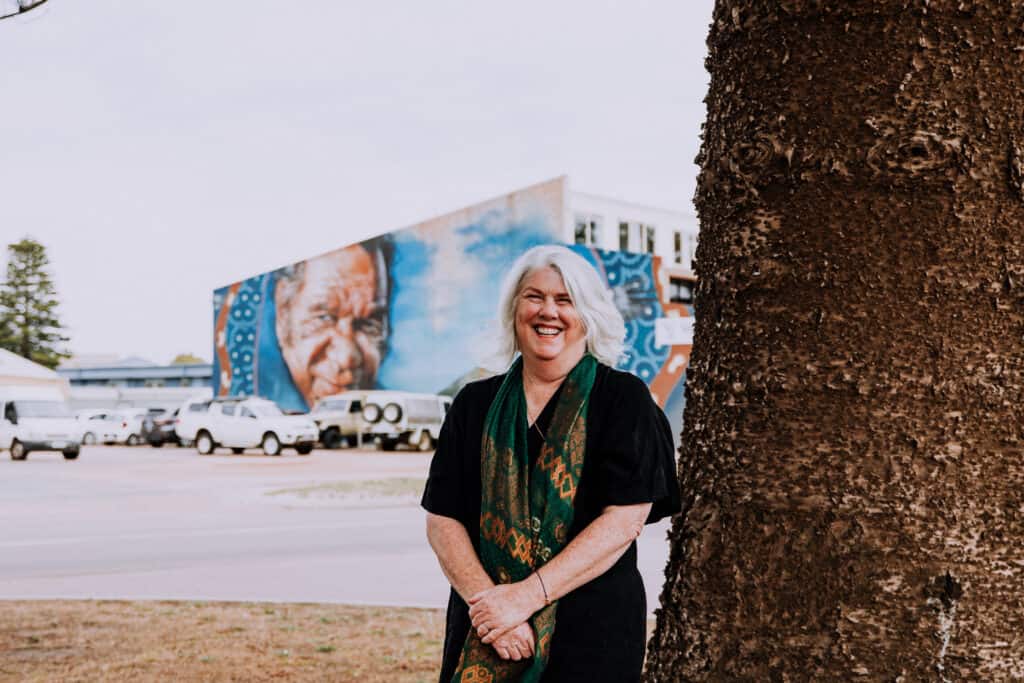
Compassion as a governing concept
Shire of Esperance Chief Executive Officer Shane Burge voiced the same view as Jo in terms of compassion as a key value in local government. Having worked in local government for 25 years, and after living in the regional centres of Busselton, Derby and Esperance, Shane has an idea of what makes rural and remote communities tick.
“Leadership is vitally important in a community, especially a community under pressure like Esperance, which has been impacted by fires, suicides, and the Jetty issue. People look for leadership and guidance.”
He says the ethos expressed by the Compassionate Charter aligned with the Shire of Esperance’s Strategic Plan.
“At the core of local government is compassion and the cohesion of community. This is a lot of what LARC is about. A lot of time has been spent focusing on developing bricks and mortar, but it is great to see that with the LARC project, the focus is on an area that we sometimes undervalue.”
Shane says he was hopeful the charter would help the Shire deal with issues. He also recognises the positive impact the charter could have on social media.
“It might encourage people to have second thoughts before bashing someone on social media: there are always two sides to every story. Leadership is about acknowledging that everyone has different ideas and giving them the ability to have a voice.”
He says the Esperance Shire Council was trying to ensure everyone in the community felt listened to. Even if outcomes did not please everyone, it was important that the community felt like it was heard. The Compassionate Charter provided a framework to encourage people to use their voices in a respectful and kind way.
“The LARC leadership process will have a long-term benefit on our community,” Shane says. “There are not enough community-led initiatives like this that have good roots in the town. It is about community building. These things are really important.”
He adds the Compassionate Charter was well suited to a place where people considered themselves lucky to be living and would encourage the community to be welcome and supportive. And as Meredith says, with the name Esperance meaning “hope”, it’s all the more fitting for the community to have a Charter that instils just that, along with kindness, and compassion.
